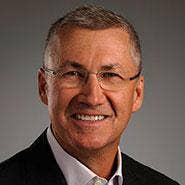Springpath's New CEO Sets Sights On Building Hyper-Converged Infrastructure Business

Hyper-converged infrastructure startup Springpath this week unveiled the appointment of a new CEO charged with helping build the company's nascent business.
Terry Cunningham, a long-time industry and channel veteran, has taken over the CEO spot from Mallik Mahalingham, co-founder and former CEO of Sunnyvale, Calif.-based Springpath. Mahalingham will continue to serve as Springpath's CTO.
Springpath, a storage startup founded by former VMware engineers, in February came out of stealth mode. At the time, it also unveiled funding of $34 million and said it had signed up over 30 customers.
[Related: 13 Powerful Hyper-Converged Infrastructure Solutions]
Springpath develops its own software for turning industry-standard x86-based servers into hyper-converged infrastructure appliances.
The Springpath Data Platform software, which is sold as a subscription that starts at $4,000 per server per year, lets enterprises leverage industry-standard servers to manage and store data with a full set of enterprise-class features.
Cunningham comes to Springpath after a five-year sting as president and general manager of Evault, the cloud storage and disaster recovery business of Seagate.
Cunningham told CRN his former employer could have used a technology like that offered by Springpath if it had been available at the time.
"Evault has 13 data centers," he said. "They're always scaling storage. We ran into issues where storage vendors wanted to sell us more refrigerator-sized units. But what we really needed were smaller systems."
While the number of hyper-converged infrastructure vendors continues to grow, especially the large number partnering with the VMware EVO: Rail software stack, Springpath has a couple of unique points of differentiation, Cunningham said.
First, Springpath focuses only on software, leaving it up to customers to decide what hardware to use. "We don't force customers to buy our boxes," he said. "Instead, customers choose their own server vendors. They can mix-and-match. We give them flexibility. They can use white-box servers if they want."
Second, the Springpath technology allows the compute, cache, and storage layers to scale independently. "With Nutanix and most others, if you need more compute, you buy their boxes," he said. "If you need more storage, you buy their boxes."
Giving customers a choice of servers from an ever-expanding hardware compatibility list is an important feature of Springpath, Cunningham said. "Customers may be Cisco or Hewlett-Packard shops," he said. "They have the servers already. We let them use the hardware vendors of their choice. Why force them to buy specific hardware?"
Springpath's flexibility in terms of both offering a choice of hardware and its subscription model give it a big advantage in the hyper-converged infrastructure market, said Chris Saso, executive vice president of technology at Dasher Technologies, a Campbell, Calif.-based solution provider and early Springpath channel partner.
"If you use general-purpose servers, add storage on a pay-as-you-go service model, it's more affordable than general-purpose storage or traditional hyper-converged infrastructure solutions," Saso told CRN.
Springpath is changing the market with its focus on software and its subscription model, which allows channel partners a unique opportunity to add value, said Steve Welch, CEO of Nascent Integrated Solutions, a Los Gatos, Calif.-based solution provider and Springpath channel partner.
"There definitely seems to be room for another hyper-converged infrastructure solution, and Springpath is well-placed," Welch told CRN. "It's a very agile company. I'm already working with them to address OpenStack environments."
Cunningham said that Springpath's primary market focus is devops people who need to rapidly develop and test something. "We make it easy for them to scale fast without needing to buy a lot of systems," he said.
Springpath uses a channel-only sales model, and partners with Tech Data for distribution.
The company's channel partners number in the single digits for now, Cunningham said. "We're just starting to work with Tech Data to sign partners," he said. "I don't know if we'll sign additional distributors. For now, we don't need any others. But this could change."